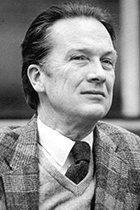The American Meteorological Society (AMS) will honor three scientists from the University of Wisconsin-Madison's Department of Atmospheric and Oceanic Sciences (AOS) — Emeritus Professor Donald Johnson, Professor Jonathan Martin, and Associate Professor Ankur Desai— at its annual meeting next month.
Johnson (M.S.'60, Ph.D.'65, Atmospheric and Oceanic Sciences), who is an AMS fellow and former AMS president, will become an honorary member of the AMS. The honorary title is a reflection of his years of service to the AMS and the scientific community at large.
Johnson served for seven years as a meteorologist on active duty in Europe and the United States for the U.S. Air Force, before coming to UW-Madison as a graduate student in 1959. After receiving his Ph.D., he taught at the university for 30 years.
"Students were always a high priority," he says. "I made sure I was always there to help if they needed it, but I didn't dictate what they needed to do. I offered a list of options and they could decide from there.”
Starting in 1981, Johnson led the development of a series of video modules for teaching atmospheric sciences. More than 100 universities and organizations worldwide implemented the modules, upending traditional approaches to science education.
Another driven educator, Martin will receive the Edward N. Lorenz Teaching Excellence Award, in recognition of his "outstanding teaching and mentoring that combine boundless enthusiasm with consummate skill to educate and inspire a generation of undergraduate and graduate students."
Martin began teaching at UW-Madison in 1994. He was inspired to teach early on, having not only a number of influential undergraduate professors, but also a family tradition of educators.
"My parents were both teachers, many of my aunts and uncles were teachers, so there was always an ethic about education in my family," he says.
While conducting scientific research as a graduate student, Martin realized that working for a major research university would allow him to pursue both of these passions, which brought him to UW-Madison. His research is a necessary driver for the enthusiasm and curiosity he hopes to instill in his students, he says.
"I think [research] is a critical part of becoming a good teacher. Nobody's born a good teacher. People have different aptitudes they are born with, but they don't carry you anywhere; you have to refine it, have to work at it. Part of that is staying curious and interested," he says.
Students are receptive to the energy he puts forth, he says, and he holds them to the same standard of effort. For example, Martin is a firm believer in keeping his lecture notes off-line, to encourage attendance and participation.
Martin's expertise extends beyond the classroom, too. He is a co-host of the Wisconsin Public Radio show The Weather Guys, and authored a widely used textbook, Mid-Latitude Atmospheric Dynamics: A First Course, in 2006.
For both his introductory and upper-level classes, Martin approaches the curricula as a story to convey to students — rather than individual lessons.
"There has to be a narrative," he says, "and that narrative needs to be visited every time you talk about your subject."
Desai began teaching at UW-Madison in 2007. He will receive the Clarence Leroy Meisinger Award, in recognition of his "innovative contributions toward improving the observation and modeling of biosphere-atmosphere exchanges across a range of spatial and temporal scales."
The award, named after a 1920s-era atmospheric scientist who died in the field, is given each year to a scientist who excels in the study of land-air interactions.
Desai's research is marked by big-picture, cross-disciplinary collaboration. For example, a carbon cycle study he led in northern Wisconsin brought together students and scientists to take greenhouse gas measurements in a range of land-based ecosystems.
"A lot of the science I do comes from merging data together, synthesizing results, sharing results openly, and trying to make sense across a large gradient," he says.
In addition, Desai will be the first recipient of the Early Career Achievement Award, newly implemented this year by the AMS Board of Early Career Professionals. The award recognizes Desai's achievements as a researcher, his mentorship and collaboration with other scientists, his leadership on science outreach projects, and his involvement in the AMS.

